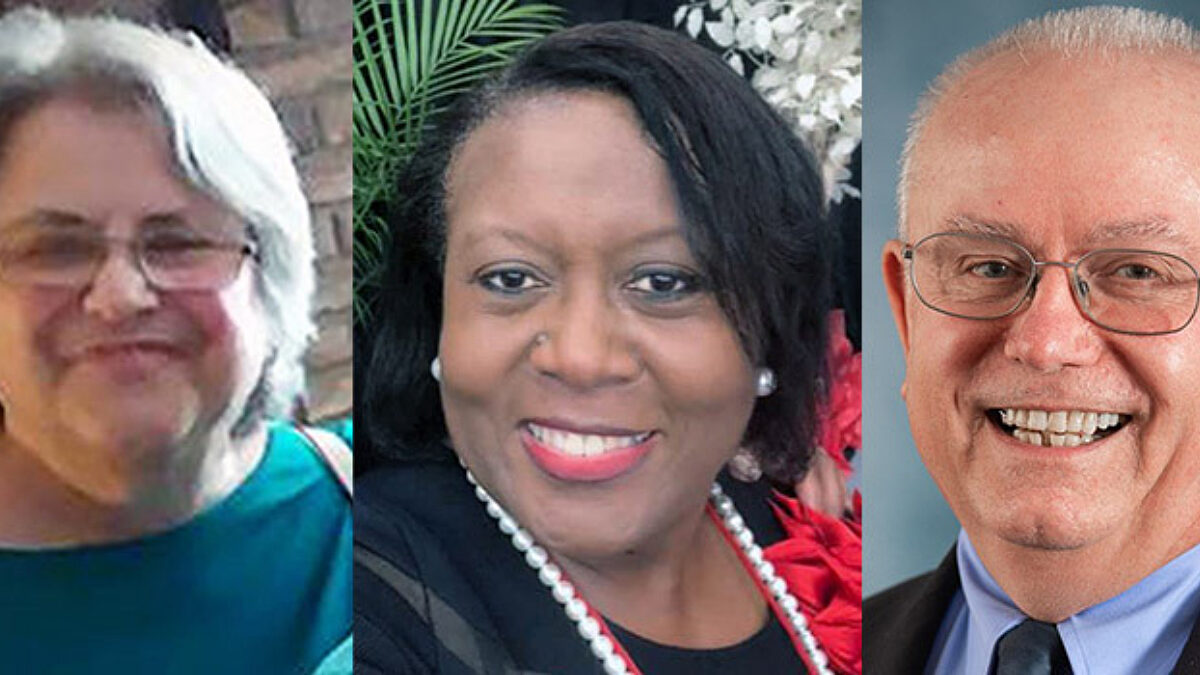
Stronger together: Green, Salter team up as new LSM co-directors
By Jessica Brodie
Lay Servant Ministries is getting a leadership shift. Instead of just one director, now it has two co-directors, each with equal responsibilities.
When Becky Green took the helm as new Lay Servant Ministries director after Jackie Jenkins rotated off, Green quickly realized how much work the position entailed—especially given Lay Servant Ministries’ new procedures for certified lay ministers. So she asked David Salter to come alongside her as LSM co-director instead of associate director. The Lay Leadership Advisory Committee, chaired by Lisa Fusco, approved the change.
“There’s a lot to it, and now that we’re looking at the certified lay minister change and all the things that go along with that, I just felt like co-directors would work better,” Green said.
Fusco said Green and Salter complement each other in their strengths, which makes for a great team.
“We look forward to supporting them and to watching LSM flourish under their leadership,” Fusco said.
“I’m excited about it and happy to do it,” Salter said, noting he and Green work in tandem with LSM Secretary Pamela Goodwine-Glover as the LSM executive team, as well as with the LSM district directors across the state.
“What we intend to do as our executive committee goal is go even farther with making South Carolina Lay Servant Ministries the best in the general church,” Salter added.
Green said she, too, is eager to see the ministry grow. It thrived under Jenkins’ leadership, and she, Salter and Goodwine-Glover are working hard to take it even further.
“The Methodist church has always valued laity,” Green said. “It’s always been almost laity driven, and I think with the way things are now that the more educated, the more informed the laity is, the better for the church. It helps the church grow, helps the church be stronger, and especially so under Bishop Holston, who’s very pro-laity.
“With the way things are going in society, we need as many people educated and informed as we can get.”
Barbara Ware, conference Lay Leader, said she thinks the shift to co-directors for LSM “is an excellent move to continue good ministry in our conference.”
Certified lay minister changes
One of the biggest opportunities this year comes with a change in procedure regarding certifying certified lay ministers, something they are doing with the Office of Clergy Services.
Currently, Salter said, there are only seven CLMs, but there are others ready now to be certified and many more expressing interest.
“Each district was seeming to do their own thing, but now we are working it out so a person who wishes to be a certified lay minister must apply, complete all requirements, then once completed send with all documentation to the Office of Clergy Services,” Salter said. “Then they can schedule their interview with their district committee on ordained ministry before LSM signs off on their certification.”
A CLM is one of many roles for a trained layperson in a church. As Salter explained, depending on the courseload they take and other efforts they engage in, a layperson can become a certified lay servant, a certified lay speaker (filling in when a pastor is ill or out of town), and finally a certified lay minister, where they can receive a pastoral assignment to a church.
CLMs take all coursework for the other roles plus complete four modules by the UMC’s Discipleship Ministries and undergo a criminal background check, a sexual ethics course and an interview.
“We’re seeing a shortage of pastors and a greater need for certified lay ministers to serve in a pastoral role,” said Salter, who noted that lay speakers used to be assigned to a church for several years if needed, but because of changes in the UMC’s Book of Discipline, they can only be assigned there one year unless they are working toward being a CLM or a licensed local pastor.
“It’s why it’s critical,” he said. “More pastors are retiring, some are retiring early and fewer people are going through the process of ordination.”
Green said there is a need for CLMs, and the changes will help the process.
“It’s a very stressful occupation, being a pastor, and with the way things are going in society right now and the way things are changing within the denomination right now, I just think there’s so much pressure on ministers,” Green said. “It’s a very demanding job for just a little bit of money.”
She said it can be helpful to have CLMs ready to step in, especially for some of the smaller churches that can’t afford to pay an ordained minister.
“We’re in different times right now, and I think the stronger the laity and the pastor-laity connection is, it helps strengthen then church, and we need to be strong in this time.”
Salter and Green recently appointed ShaRome Henry, a certified lay servant who works in the Office of Clergy Services, to serve as the official lay servant liaison between that office and Lay Servant Ministries.
They said if anyone has questions about Lay Servant Ministries or the CLM process, they are welcome to email them directly at [email protected] or [email protected], or visit the LSM page on the conference website, located at www.umcsc.org/lsm.